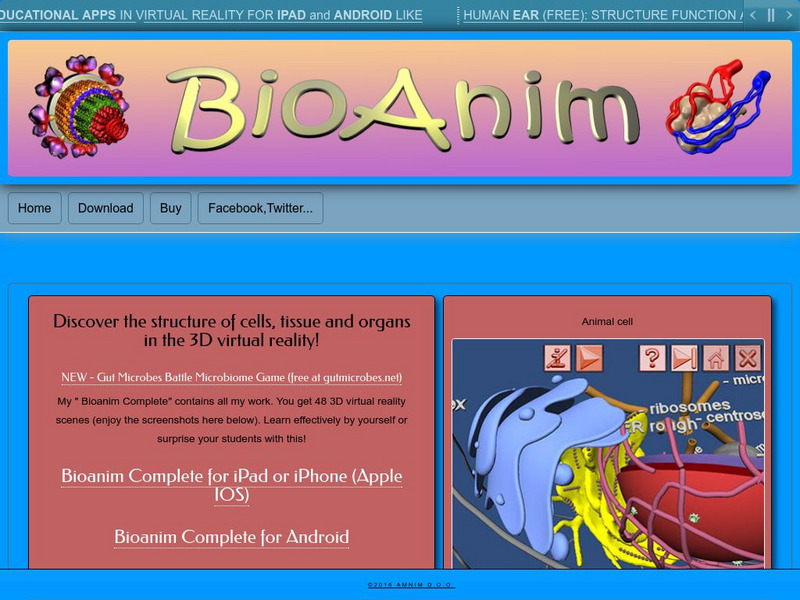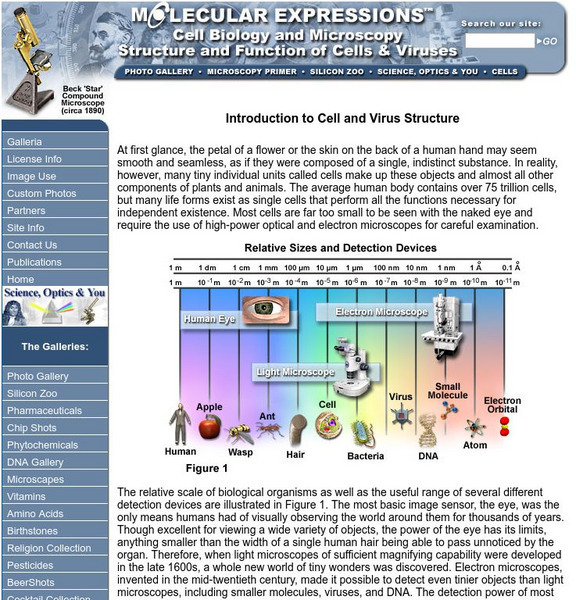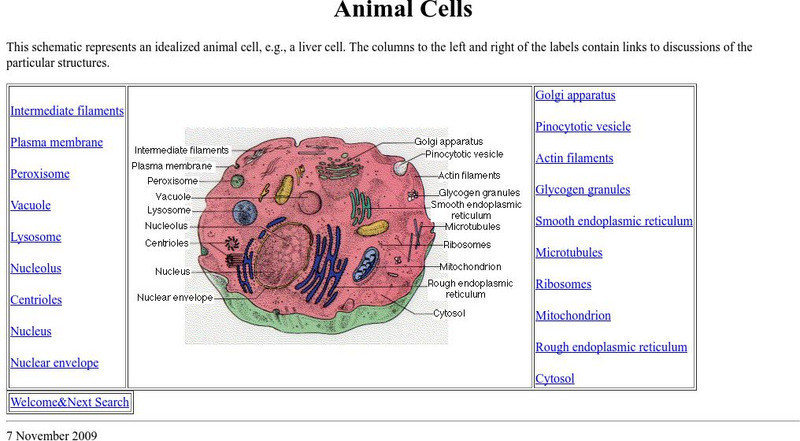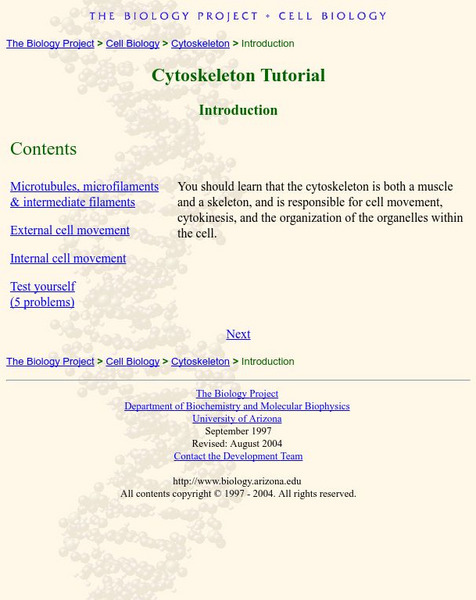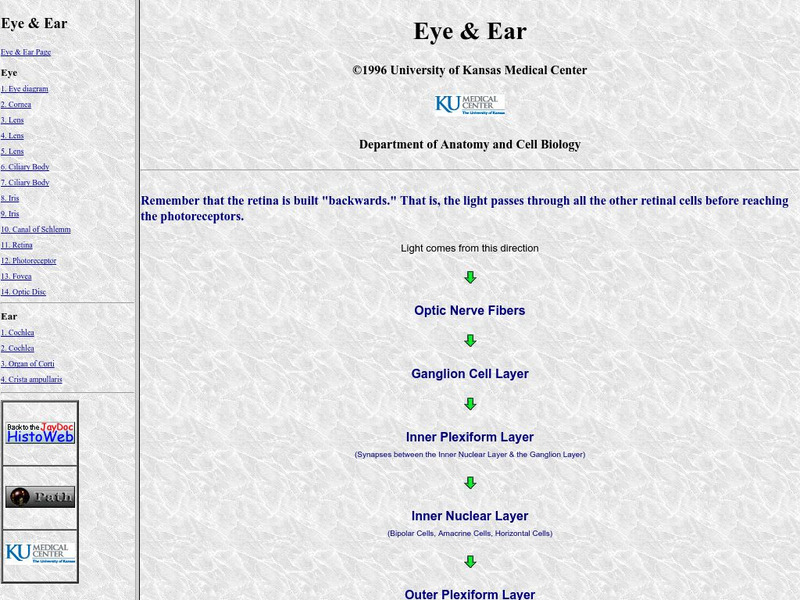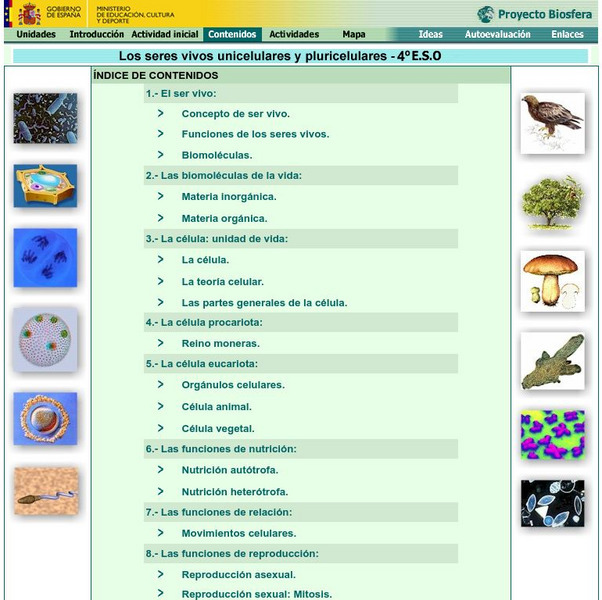Department of Defense
Do Dea: Biology: Unit 3: Cell Structure
In this third unit of a Biology course, students learn about cells and cell structure. They compare prokaryotic and eukaryotic cells and learn about the specialized structures in a cell and what their functions are. They will also learn...
PBS
Pbs Learning Media: Cellular Structure and Function
This lesson plan provides an exploration of the structure and function of the cell in organisms. Young scholars will consider the cell as a common unit of life, mitosis, and cell specialization. Includes links to multimedia resources.
eSchool Today
E School Today: Living Organisms Are Made Up of Cells
Discover how living things are made up of cells.
Other
Bio Anim
BioAnin presents 3-D labeled images of all of the major systems of the human body, for example, the digestive system and the endocrine system. The images are embedded in slideshows. The site also has interactive 3-D models that can be...
ibiblio
Ibiblio: Virtual Cell Web Page
A teacher- and student-contributed website of 3-D models and explanations of cell structures.
Florida State University
Florida State University: Molecular Expressions: Introdution to Cell and Virus Structure
This resource provides a detailed diagram of animal, bacterial and plant cells and viral structure. Also included are detailed drawings, with definitions, of each of the cellular organelles.
Biology Pages
Kimball's Biology Pages: Animal Cells
A diagram of a labelled animal cell. Major structures of the animal cell have linked reference information about their structure and function.
Exploratorium
Exploratorium: Single Cell to Embryo
Watch this brief animation of the process of a zebrafish egg developing from a single cell into an embryo in 50 hours. Click on other links to watch animations of a zebrafish cell division, migration and differentiation.
University of Arizona
University of Arizona: Cytoskeleton Tutorial
In this interactive tutorial you will discover that the cytoskeleton is both a muscle and a skeleton, and is responsible for cell movement, cytokinesis, and the organization of the organelles within the cell.
Texas Instruments
Texas Instruments: Cell Structure/function
This StudyCards stack enables students to review information about the organelles of eukaryotic plant cell. They are tested on their ability to describe the structure, location, and function of different cell organelles.
Texas Instruments
Texas Instruments: The Bigger the Better?
In this activity, students calculate the surface area and volume of different shaped cell models. They develop an understanding of the differences in cells and their function
Texas Instruments
Texas Instruments: General Cell Questions
This StudyCards stack enables students to review general concepts regarding cells.
Texas Instruments
Texas Instruments: Is There a Limit?
In this activity, students examine data about bacteria and their growth. They produce a scatter plot, a best-fit model, and draw conclusions based on the data and graph.
Texas Instruments
Texas Instruments: Cell Components
This StudyCards stack enables students to review the terms associated with the structures that comprise a living cell.
University of Kansas Medical Center
University of Kansas Medical Center: Gastrointestinal System
Investigate the human gastrointestinal system with this extensive collection of microscopic specimens.
University of Kansas Medical Center
University of Kansas Medical Center: Eye & Ear
Understand the structure and function of the eye and ear cells by examining these microscopic tissue samples.
South Carolina Educational Television
Etv: Kids Work!: Hospital: Medical Lab Technician
Follow this interactive to identify the differences between bacteria and viruses. Look through the lens of a microscope to observe how each functions and impacts humans.
Science Education Resource Center at Carleton College
Serc: Observe, Describe, Compare and Contrast Cells
This investigation allows students to observe cells from multiple sources. Plant, animal and bacterial cells will be observed as well as cells from multicellular organisms and single-celled organisms. After providing written descriptions...
Scholastic
Scholastic: Study Jams! Science: Animals: Animal Cells
A slideshow and a short multiple-choice quiz on the topic of animal cells.
University of Wisconsin
The Why Files: Of Cancer 'N Car Keys
"The real, life-threatening problem with most cancers is that they migrate away from the initial site." This article delves into the question of "How do cancer cells move about?"
National Institute of Educational Technologies and Teacher Training (Spain)
Ministerio De Educacion: Los Seres Vivos Unicelulares Y Pluricelulares
In this unit you will be introduced to the complexity of living things. It also reviews the kingdom of nature, differentiating between their main features from those who are microscopic unit-cellular to the multi-cellular visible to the...
Palomar Community College District
Palomar College: Basic Cell Structure
This site will introduce the basics of the cell. Learn about the essential cell function, chromosomes, and the basic structure.
Ohio State University
Ohio State Univ.: Cell Expansion and Differentiation
This essay is complemented by useful illustrations of how plant cells enlarge after mitosis and become specialized for different functions. A good supplement to plant growth studies.
Ohio State University
Ohio State University: Cell Membranes
Diagrams and animations help you understand the basics of cell membrane structure and function.





